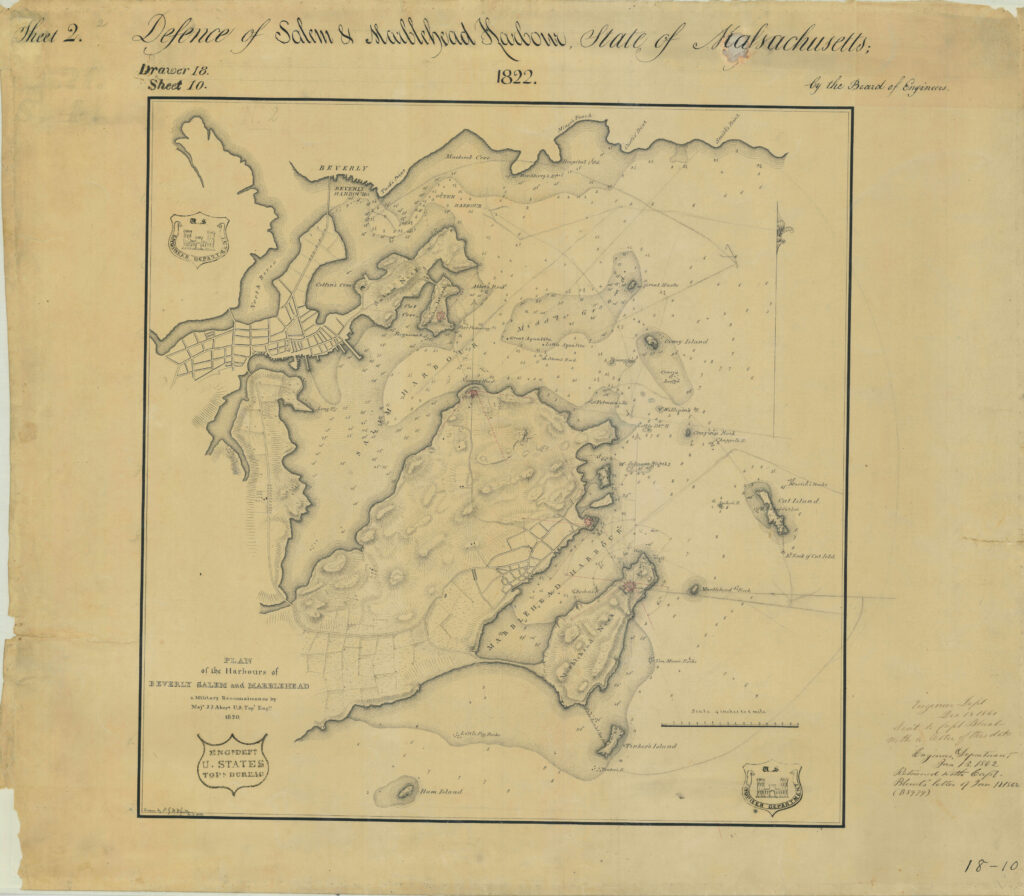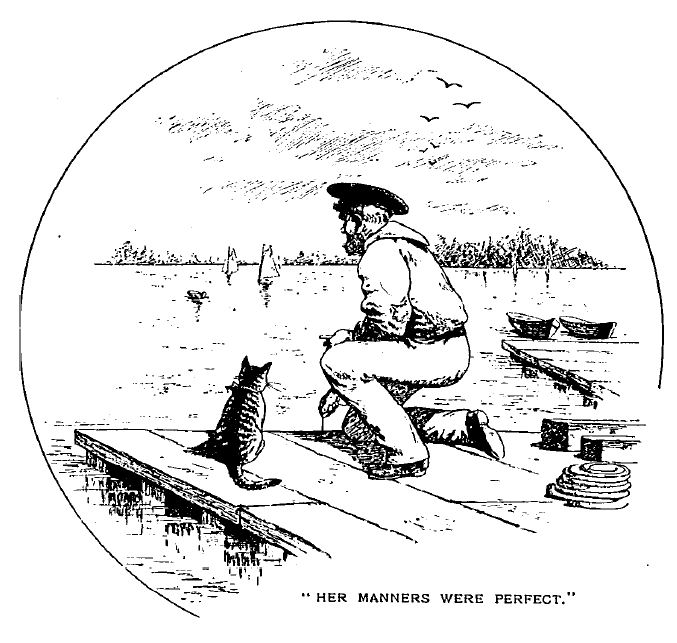Remnant
By Margaret Johnson
Annotations by Josh Benjamin

The cats of Marblehead [1] always seemed to me a very important part of the population. There was Post-Office Tom, over on the Neck [2], a great, handsome fellow who presided over the distribution of the mails, looking down with big green eyes from his lofty perch on the very top of the pigeon-holed cabinet where the letters awaited their owners.
There was the bewitching Maltese kitten who took me in charge when I went sketching in the old town, and sat demurely at my side while I worked, with an occasional scamper after her own frolicsome gray tail by way of refreshment. There were various aristocratic cottage cats, sleek and proud; and there was Remnant.
The first time I saw her, the little steamer had just come in from the Neck, and the people were hurrying to and fro, some going ashore and some running to take their places in the boat; and Remnant, not a bit abashed by all the bustle, looked on with her bright eyes from the post where she lay basking in the sunshine, and evidently feeling herself the proprietress of the whole affair.

Digital Public Library of America.
It seemed a strange place for a cat, I thought; but she was quite as much at home among the boats and piles of timber and dingy wharf-houses as is your own puss in her peaceful backyard, or her corner by the kitchen stove.
She was a pretty creature, black and gray and tawny yellow, with snow-white breast and paws, and because of this coloring, like a piece of gay calico, the sailors gave her the curious name of “Remnant.” She had a family of kittens somewhere among the old canvas in one of the dark sail-lofts; but she had hidden them away so safely that even her good friends the sailors could not find them.
All night she stayed with them, and part of the day, but I am sure she felt equally the responsibility of looking after the wharf, to see that the boats came and went regularly, and that the float was kept as clean as a tidy cat would wish to see it.
And how was she fed? No doubt there were plenty of rats and mice about the wharves, but Remnant had a taste for daintier fare, as you shall see.
When the little steamer had puffed away again, and the deserted float swayed gently on the quiet water, kind Captain T. looked up at Remnant, where she still sat on her post in the sunshine.
“I guess you’re hungry, puss,” he said. “It’s about dinner-time.” Then he called, “Kit, kit, kit!” She blinked her eyes lazily, and did not move. The captain smiled at me.
“This will fetch her,” he said, and took a fishing-reel out of his pocket.
“Kit, kit, kit!” he called again softly, holding it up so that she could see. And Remnant understood. Down she came, stepping gravely along the gangplank, and looked up with questioning eyes in the captain’s face.
“Are you hungry, puss?” he asked.
“Me-ow!” she answered gently, with a wave of her plumy tail.
Then the captain knelt down on the float, unwound his reel and dropped the line into the water, and Remnant settled herself beside him, watching every movement with an air of entire familiarity with the proceedings. She was too well-bred to show any impatience.

Her manners were perfect, though she was not born and brought up on the wharf, and had not had the advantages which your pussy has enjoyed. She cocked her pretty head on one side with an expression of alert and intelligent interest, restrained by a gentle dignity. Jerk! up came the line. A quiver ran through Remnant’s delicate body. But there was only a bit of seaweed on the hook, and down it went again.
Over and over this happened, and still with unwearied patience the man knelt and threw his line, and the cat sat motionless beside him, gazing gravely down into the dark water. The float rose and fell on the tide, and the sunshine lay warm on the boards, and I watched the pretty sight, smiling, from my bench corner.
“I’m afraid you’ll have to go hungry, puss,” said the captain at last. “They won’t bite to-day.” And then, as he spoke, jerk! up came the line again, and he sprang to his feet, for this time there was a little fish dangling and shining on the hook!
Remnant would have liked to jump for joy, I think. But she didn’t. She caught the fish in her white paws, with a soft “me-ow!” for “thank you,” when the captain tossed it to her, and walked away to enjoy her dinner in a sheltered corner; after which she sought her young family to tell them, no doubt, about the fishing, while the good captain wound up his line and went whistling off to his own dinner.
A wise cat was Remnant! Down on her wharf she might miss some of the privileges enjoyed by her fashionable cottage friends, but which of them had a fresh fish dinner caught and served up every day for her own especial benefit?

Johnson, Margaret. “Remnant.” The youth’s companion 72, No. 27 (July 1898): 327.
[1] Marblehead is a coastal town in Massachusetts, about 16 miles northeast of Boston. It was established as part of Salem in 1635 and became independent in 1649. Order from the General Court of the Massachusetts Bay Colony quoted in The Founding of Marblehead, by Thomas E. Gray, Gateway Press, 1984.
[2] The Neck is a smaller bit of land connected by a causeway to the main peninsula of Marblehead. It is the site of the Marblehead lighthouse and in the later 19th century became a neighborhood for the wealthy.
Contexts
The area now known as Marblehead was originally part of Salem and inhabited by the Naumkeag of the Algonquin Nation, who had named it Massebequash. Smallpox outbreaks in the early 1600s decimated the Naumkeags, and in 1686, the white settlers took ownership of the land through a deed made with the descendants of Wenepoykin, who had died two years prior as a slave in Barbados. It was a hub for the U.S. Naval activity and New England fishing industry throughout the late 18th and 19th centuries.
During the 19th century, cats were not commonly the domesticated companions they are now. Throughout much of history, aside from ancient Egypt, they were severely mistreated and considered evil. By the mid-1800s, cats were still subject to an undeserved reputation on par with weasels and raccoons, as noted by cat historian Paul Koudounaris in “‘The Feline States of America’: How Cats Helped Shape the US.”
Resources for Further Study
- A historical perspective on the indigenous populations around Salem, Massachusetts.
- Marblehead created out of Salem on May 6, 1635.
- Historical maps of Marblehead for exploration.
- A summary article of a book about the Cape Cod fishing industry in the 19th century: Clearing the Coastline: The 19th Century Ecological and Cultural Transformation of Cape Cod, by Matthew McKenzie.
- Images of the cod fishing industry in Gloucester, Massachusetts in the 19th century.
- The Library of Congress research guide to Cats as Pets.
Contemporary Connections
Fishing continues to be an area where commercial enterprise encroaches upon indigenous fishing and BIPOC fishers face racism. The community organization Brown Folks Fishing works to challenge the “white supremacy, erasure, and colonialism” surrounding fishing and other conservation activities, and the ongoing situation faced by the Mi’kmaq fishers in Nova Scotia is just one of many instances of the clash between commercial and indigenous fishers.